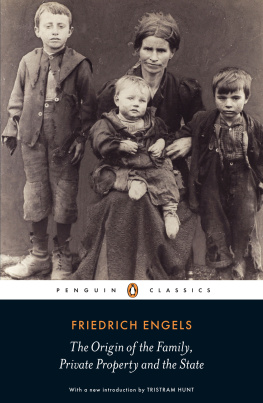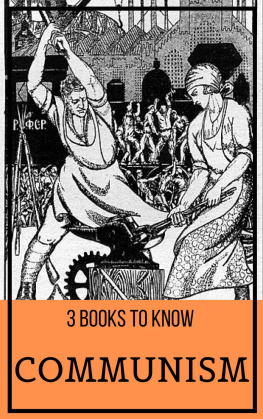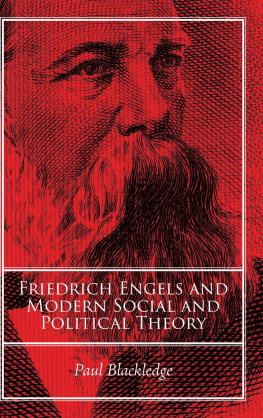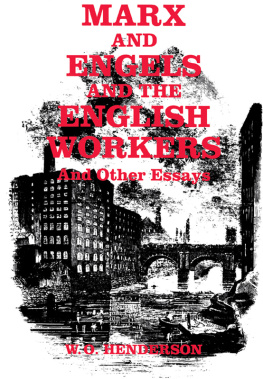FRIEDRICH ENGELS was born in Germany in 1820, the son of a textile manufacturer. After his military training in Berlin he became Manchester agent of his fathers business, and soon became immersed in Chartism and the problems of the urban proletariat newly created by the industrial revolution. In 1844 he wrote this famous book and by 1848 he was a firm friend of Marx. Their ideas were incorporated into The Communist Manifesto, although the writing of the Manifesto itself was solely Marxs work. Engels provided Marx with money, and after 1870 spent all his time assisting him in his research and in supplying ideas and leadership to international socialism. After Marxs death Engels continued his work in Das Kapital, and completed it in 1894, a year before his own death. He also wrote The Peasant War in Germany, The Origin of the Family and Socialism, Utopian and Scientific, and much else.
VICTOR KIERNAN was born in 1913 and studied at the Manchester Grammar School and Trinity College, Cambridge. After a period of teaching and other work in India he joined the History Department at Edinburgh University, where he became a professor before retiring in 1977. His publications include British Diplomacy in China 18801885 (1939, 1970); The Revolution of 1854 in Spanish History (1966); The Lords of Human Kind (1969, etc); America: The New Imperialism (1978); State and Society in Europe 15501650 (1980); Colonial Empires and Armies 18151960 (1982, 1998); The Duel in European History (1988); a study of the social history of tobacco (1991); two studies of Shakespeare (1993, 1996); one of Horace and his Rome (1999); verse translations of two anthologies of Indian (Urdu) poetry; and four volumes of collected essays, historical or literary.
FRIEDRICH ENGELS
The Condition
of the Working Class
in England
EDITED WITH A FOREWORD BY
VICTOR KIERNAN
Penguin Books
PENGUIN BOOKS
Published by the Penguin Group
Penguin Books Ltd, 80 Strand, London WC2R 0RL, England
Penguin Putnam Inc., 375 Hudson Street, New York, New York 10014, USA
Penguin Books Australia Ltd, 250 Camberwell Road, Camberwell, Victoria 3124, Australia
Penguin Books Canada Ltd, 10 Alcorn Avenue, Toronto, Ontario, Canada M4V 3B2
Penguin Books India (P) Ltd, 11 Community Centre, Panchsheel Park, New Delhi 110 017, India
Penguin Books (NZ), Ltd, Cnr Rosedale and Airborne Roads, Albany, Auckland, New Zealand
Penguin Books (South Africa) (Pty) Ltd, 24 Sturdee Avenue, Rosebank 2196, South Africa
Penguin Books Ltd, Registered Offices: 80 Strand, London WC2R 0RL, England
www.penguin.com
First published in Germany 1845
This translation first published in the USA 1886
Published in Great Britain 1892
Published with some revisions in Penguin Classics 1987
19
Foreword, copyright Victor Kiernan, 1987,
All rights reserved
Except in the United States of America, this book is sold subject to the condition that it shall not, by way of trade or otherwise, be lent, re-sold, hired out, or otherwise circulated without the publishers prior consent in any form of binding or cover other than that in which it is published and without a similar condition including this condition being imposed on the subsequent purchaser
EISBN: 9780141905280
Contents
The state of the workers before the Industrial Revolution The jenny Emergence of the industrial and the agricultural proletariat The throstle, the mule, the power-loom, the steam-engine The victory of machine-work over hand-work The development of industrial might The cotton industry The hosiery manufacture The manufacture of lace Dyeing, bleaching, printing The manufacture of wool The linen trade The manufacture of silk The production and manufacture of iron Coal-mining The production of pottery Agriculture Roadways, canals, railroads, steamboats Summary The emergence of the proletariat as a factor of national importance The middle-classs view of the workers
Classification of the proletariat Centralization of property The levers of modern manufacture Centralization of population
The impression produced by London The social war and the system of general plundering The lot of the poor General description of the slums In London: St Giles and the adjoining quarters Whitechapel The interior of the workers dwellings The homeless in the parks Night refuges Dublin Edinburgh Liverpool Factory towns: Nottingham, Birmingham, Glasgow, Leeds, Bradford, Huddersfield Lancashire: general description Bolton Stockport Ashton-under-Lyne Stalybridge Detailed description of Manchester: the general system of its building The Old Town The New Town The method of construction of working-mens quarters Courts and side streets Ancoats Little Ireland Hulme Salford Summary Lodging-houses Overcrowdedness of population Cellar dwellings The clothing of the workers Food Tainted meat Adulteration of provision False weights, etc. General conclusion
Competition among the workers determines the minimum of wages, competition among the property-holding people determines their maximum The worker, the slave of the bourgeoisie, is forced to sell himself by the day, and by the hour Surplus population Commercial crises A reserve army of workers The hard lot of this reserve army during the crisis of 1842
The causes and figures Description by Thomas Carlyle Lack of cleanliness, crudeness and drunkenness among the Irishmen The influence of Irish competition and of the contacts with the Irish upon the English workers
Preliminary remarks The influence of the above-described conditions on the health of the workers The influence of large towns, dwellings, uncleanliness, etc. The facts Consumption Typhus, in particular in London, Scotland and Ireland Digestive troubles The results of drunkenness Quack remedies Godfreys Cordial Mortality among workers, especially among young children Accusation of the bourgeoisie of social murder Influence on the mental and moral condition of the workers Absence of the necessary conditions for education inadequacy of evening and Sunday schools Ignorance The workers living conditions give him a sort of practical training Neglect of the workers moral training The law as the only instructor in morals The workers conditions of life tempt him to disregard law and morality The influence of poverty and insecurity of existence upon the proletariat Forced work The centralization of the population Irish immigration The difference in character between the worker and the bourgeois The proletarians advantages over the bourgeois The unfavourable sides of the proletarian character Drunkenness Sexual irregularities Neglect of family duties Contempt for the existing social order Crimes Description of the social war
The influence of machinery Hand-loom weavers The work of men being superseded by machinery Female labour, the dissolution of the family The reversal of all relations within the family The moral consequences of the mass employment of women in factories Jus primae noctis The work of children The apprentice system Subsequent measures The facts related by the Factory Report Long working-day Night-work Cripples Other deformities The nature of factory work Relaxation of the whole organism Special diseases Testimony of the Commissioners Premature old age The specific influence of factory work upon the female physique Some especially injurious branches Accidents The bourgeoisies opinion of the factory system Factory laws and agitation for the Ten Hours Bill The stupefying and demoralizing nature of factory work Slavery Factory regulations The truck system The cottage system The comparison of the serf of 1145 with the free working man of 1845













